E-Newsletter dsfsfa

Ministers Bibeau and Ng respond to changes proposed to “Product of USA” labelling regulations
(March 7, 2023 – Ottawa, Ontario – Agriculture and Agri-Food Canada) Canada’s Minister of Agriculture and Agri-Food, the Honourable Marie-Claude Bibeau, and Minister of International Trade, Export Promotion, Small Business and Economic Development, the Honourable Mary Ng, released the following joint statement in response to the advance notice of changes that will be formally proposed by the United States to the “Product of USA” voluntary labelling regulations for meat, poultry and egg products.
“The Canada and United States meat and livestock sectors are highly integrated. This collaboration contributes to the growth and resilience of farmers and processors on both sides of the border. It also allows us to ensure a reliable supply of high-quality products.
“Canada remains concerned about any measures that may cause disruptions to the integrated North American livestock supply chains.

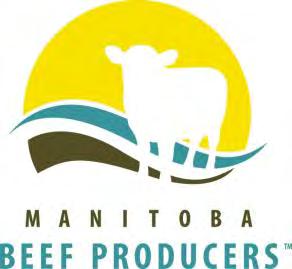
“Canada will closely review the proposed amendments to the labelling of meat, poultry and egg products in the U.S. and will participate in the U.S. rule-making process to ensure that these changes conform to the U.S.’

international trade obligations and do not disrupt supply chains.
“Canada will also firmly oppose any proposition from the United States to renew a mandatory country of origin labelling system for pork and beef, a practice which the World Trade Organization allowed Canada to take retaliation measures against the United States.
“Canada will work with the U.S. to ensure that new definitions and rules allow farmers, processors and consumers in both countries to continue to benefit from efficient, stable and competitive markets.”
Note: To see the news release “USDA Proposes New Requirements for the “Product of USA” Label Claim” go to: https://www.usda.gov/media/pressreleases/2023/03/06/usda-proposes-new-requirementsproduct-usa-label-claim
 An update from MBP March 10, 2023 mbbeef.ca
An update from MBP March 10, 2023 mbbeef.ca
MANITOBA BEEF PRODUCERS 2023-24 Scholarship Intake
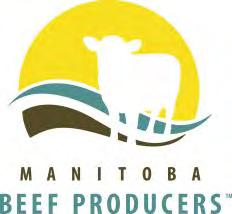
Manitoba Beef Producers is pleased to make available six $1,000 scholarships annually for MBP members or their children attending a university, college, other post-secondary institution or pursuing trades training. Preference will be given to those students pursuing a field of study related to agriculture or to those acquiring a skilled trade or pursuing a career that would be beneficial to the rural economy.
This application process is for students who will be undertaking post-secondary studies or trades training in the 2023-24 academic year. The deadline to apply is 4:30 p.m. on Friday, June 23, 2023.
The scholarship criteria are as follows:
Eligibility:
• Must be an active Manitoba beef producer or the child of an active Manitoba beef producer Note: This can also include active beef producers returning to school after a period of time in the workforce.
• Must be pursuing post-secondary studies or trades training in the 2023-24 academic year.
• Post-secondary programs or trades training must be a minimum of one academic year in duration.
Items You Are Required to Submit:
• The completed application form;
• Either a typed 600-word (maximum) essay OR a 5-7 minute maximum video submission discussing the topic “What the beef industry means to my family, my community and Manitoba.” Also, you need to identify in the essay or video the reasons you enjoy being involved in agriculture*;
• A copy of your transcript (either high school, or a recognized college, university or trade school);
• Proof of enrolment in a recognized institution (current transcript, or your acceptance letter, or a letter of intent indicating your intended institution and field of study for 2023-24);
• A list of your community involvement (e.g. 4-H, community clubs, volunteer work, etc.); and,
• The names of two references, including their addresses and telephone numbers.
*Note: Scholarship winners’ essays or video submissions will be published in Manitoba Beef Producers’ newspaper Cattle Country in February 2024 or posted to MBP’s social media channels and website.
The completed application, all supporting documents, references, required essay or video, etc. must be submitted to MBP no later than 4:30 p.m. Friday, June 23, 2023 to the attention of:
Manitoba Beef Producers Scholarship Committee
220 – 530 Century Street
Winnipeg MB R3H 0Y4
E-mail: info@mbbeef.ca
Fax: (204) 774-3264
For more information, including steps on how to submit your video, please contact Manitoba Beef Producers at 1-800-772-0458 or email info@mbbeef.ca. A selection committee will review the submissions. Winners will be notified by September 11, 2023.
1
MBP 2023-24 Academic Year
SCHOLARSHIP APPLICATION
PLEASE PRINT
Name: _______________________________________________________________________________
Mailing address: _______________________________________________________________________
Telephone: _____________________________ Email:
Date of birth: _____________________________
Parents’ names if you are under 18: _______________________________________________________
Are you a beef producer? _____________________________
Are you the child of a beef producer? ________ If yes, what is their name(s)?
Current institute of enrolment: ________________________________________________________ Institute and your intended program of post-secondary study or skilled trades training in 2023-24:
Duration of post-secondary program or skilled trades training: _________ year (s)
Essay or Short Video Submission Requirement: Please submit either a typed 600-word (maximum) essay* OR a 5-7 minute video on the topic “What the beef industry means to my family, my community, and Manitoba.” Also include the reasons you enjoy being involved in agriculture No preference will be given to either option.
*Note: Scholarship winners’ essays or video submissions will be published in Manitoba Beef Producers’ newspaper Cattle Country in February 2024 or posted to MBP’s social media channels and website.
Please return the following: completed application form; typed essay or video submission; a copy of your transcript; proof of enrolment in a recognized institution or an apprenticeship program (current transcript, letter of acceptance, or a letter of intent to pursue further studies); a list of your community involvement; and, your references no later than 4:30 p.m., Friday, June 23, 2023 to the attention of:
Manitoba Beef Producers Scholarship Committee

220 – 530 Century Street
Winnipeg, MB R3H 0Y4
Email: info@mbbeef.ca
Fax (204) 774-3264
2
Manitoba Municipal Relations reminds all Manitobans that daylight saving time will start in the province early on March 12, when clocks move forward one hour.

Under the Official Time Act, daylight saving time starts on the second Sunday in March and ends on the first Sunday in November. The official time change will occur at 2 a.m., Sunday, March 12, at which time clocks will move forward to 3 a.m.
The change from daylight saving time in the spring to standard time in the fall will continue in Manitoba until neighbouring jurisdictions pass legislation adopting permanent daylight saving time. Previously planned public engagement will begin when neighbouring jurisdictions take action, to ensure the perspectives gathered from Manitobans are timely and relevant. The province will continue to monitor developments and evaluate the best possible options for Manitoba.

Provincial Government Unveils Budget 2023
(March 7, 2023 Province of Manitoba News Release) To help Manitobans make ends meet, Budget 2023 delivers an unprecedented $1.8 billion in affordability and tax measures while bolstering vital programs and services Manitobans most rely on with a record-setting investment of $2 billion, Premier Heather Stefanson and Finance Minister Cliff Cullen announced today.
“In the last year, the Manitoba economy emerged faster and stronger than anyone could have anticipated with more Manitobans working than ever before,’’ said Stefanson. “Budget 2023 reinvests every cent of new revenue to help Manitobans and our most vital services – all accomplished while keeping the province on track to eliminate the deficit.”
It is a budget that will leave more than $5,500 in the pockets of the average family by 2024 while delivering across-the-board funding increases in all 19 government departments. Budget 2023 projects a $363-million deficit, down $15 million from the current 2022-23 forecast of $378 million, the minister noted.
Budget 2023 includes the largest personal income tax reduction in Manitoba history. Changes to the Provincial Basic Personal Amount will ensure that Manitobans do not pay a cent of income tax on the first $15,000 they earn in 2023. This measure alone will save the average two-income family over $1,000 and will remove 47,400 low-income Manitobans from the tax rolls. Changes to tax bracket thresholds in 2024 will provide even greater savings for Manitobans.
“At a time when Manitobans need it most, Budget 2023 will help people across all areas of family and community life while we work hard to create economic opportunities,” Cullen said. “This budget is about doing everything possible for Manitobans at a time when they need it most.”
At the same time, the Manitoba government is redoubling efforts to help heal the health-care system, with the largest-ever investment of $7.9 billion. That is an increase of $668 million to help shorten wait times and rebuild the front lines. Budget 2023 also initiates a $1.2-billion multi-year capital campaign that will add capacity to nine facilities including in rural hospitals, St. Boniface Hospital, Grace Hospital, CancerCare Manitoba and Health Sciences Centre, the minister said.
“Budget 2023 is making significant investments to heal health care in our province to help people get the care they need, when and where it’s needed,” Cullen said. “We’re making foundational investments to reduce diagnostic and surgical backlogs, hire more health professionals and support health infrastructure needs but we’re also expanding coverage for diabetes insulin pumps and glucose monitors, and creating a new hearing aid program for Manitobans.”
The budget provides an historic investment of more than $100 million to address the challenges of violent crime and homelessness across Manitoba.
“We all want to feel safe in our homes, on our streets and in our communities,’’ Cullen said. “Budget 2023 addresses the root causes of crime, with significant investments in homelessness, shelters and housing, addictions beds and enhanced services for mental health. There is also more for front-line police officers to fight violent crime.”
Budget 2023 reflects that a growing Manitoba starts with stronger communities and supports for affordable, quality services close to home.
Manitoba schools will benefit from historic funding – the largest increase in a quarter century – bringing funding for kindergarten to Grade 12 schools to $1.7 billion, up $100 million
continued on pages 6-9
Provincial Government Unveils Budget 2023
from last year. The Manitoba government is also well on its way to creating 23,000 affordable child-care spaces and will invest $76 million this year to introduce affordable child care three years ahead of plans in other provinces. Budget 2023 will provide more help than ever before for Manitobans with disabilities as funding increases to $640 million.
Budget 2023 contains an historic investment of $217 million in total municipal operating funding – $47 million more than last year and the largest increase in a decade. Millions more are earmarked for wastewater treatment, transit and other capital projects, the minister added.
“From additional municipal funding to investments in education, child care, disability service, arts, culture, parks and the environment, Budget 2023 delivers, building stronger communities to improve the quality of life for all Manitobans,” Cullen said.
Future growth depends on creating new opportunities and continuing to attract skilled workers, the minister said. Last year, Manitoba welcomed more than 21,000 newcomers including 14,000 people through the Provincial Nominee Program. Already, 85 per cent of these nominees have secured employment. As well, more than 17,500 Ukrainians who have presented at Manitoba’s reception centre will continue to receive the province’s unwavering support, the minister said.
This is important as Manitoba expects to have 114,000 new job openings over the next five years. Three in five of these jobs will require some form of university training. To meet this challenge head-on, Cullen said, Budget 2023 will invest $65 million more into post-secondary institutions and cap university tuition increases at 2.75 per cent.
This year’s budget assists small business growth and supports the creation of new made-inManitoba jobs by increasing investments in loans and guarantees by $27 million to incent private-sector investment in enterprises that can demonstrate significant, sustainable growth and job creation. It also includes $15 million for the Community Economic Development Fund and $20 million to support economic development and investment attraction.
The Manitoba government recognizes the need for new investment opportunities. Budget 2023 doubles the funds dedicated to venture capital to $100 million and eliminates payroll taxes for an additional 150 employers.
The payroll tax rate will be reduced for the first time in 25 years in 2024, if the economy continues to perform as it has this year. The minister noted this is an important first step to phasing out this tax.
To support growth, Budget 2023 invests a further $40 million to develop infrastructure to allow CentrePort South to expand and will invest $147.6 million over two years to improve the Hudson Bay rail line to the Port of Churchill.
“Our message to investors is simple – come grow in Manitoba,’’ Cullen said. “We are investing more than $2.5 billion in tradeenabling highway infrastructure over the next five years and making investments to spur economic development opportunities and generate well-paying jobs. Combined, the opportunities that lie ahead will support vital services, strengthen the government’s fiscal position and provide historic help for Manitobans.”
For more information on Budget 2023 and what it means to Manitobans, visit www.manitoba.ca and see the accompanying backgrounder.
Historic Help for Manitobans
Budget 2023 includes historic investments that willbring total tax and affordability measures to more than $1.8 billion between 2022 and 2024, providing $5,500 in total savings for the average two-income family by 2024:
$311 million in tax relief through increases to the Provincial Basic Personal Amount in 2023, saving the average two-income familymore than $1,000 in income taxes this year;
$160 million to increase income tax bracket thresholds to $47,000 and $100,000 in 2024;
combined, the Provincial Basic Personal Amount and tax bracket enhancements will save the average two-income family more than $1,250 in 2024;
increasing the School Tax Rebate to 50 per cent on farm and residential properties, saving the average homeowner $774 this year;
$190 million to reduce payments charged to Manitoba Hydro, saving Manitoba Hydro and ratepayers more than $4 billion over the next 20 years;

increases to the minimum wage in April and October, bringing it to more than $15 per hour; and
FamilyAffordability Package and the Carbon Tax Relief Fund payments provided the average family with $825 since fall 2022 to combat rising costs.
Safer Streets
Budget 2023 includes an historic investment of more than $100 million to address the challenges of violent crime and homelessness across Manitoba:
$51.8 million for Manitoba’s Violent Crime Strategy over two years, with $34.6 million allocated this year;
more than $51 million for Manitoba’s Homelessness Strategy;
$3.6 million for the Downtown Community Safety Partnership to build a safer, more inviting downtownWinnipegfor businesses and residents;
$100,000 to support ongoing operations of the Winnipeg Bear ClanPatrol Inc.;
$9.4 million for 1,000 newtreatment spacesfor providers of substance-use and addictions treatment services across Manitoba;

$1 million to supportexpansion of crisis stabilization unit beds and tele-psychiatry services to expand access to Manitobans living in rural and remote communities;
$1.5 million in child and youth mentalhealth services to improve access and reduce wait times; and
$600,000 for flexible-length community residential withdrawal management beds in Brandon.
••••••••••••••••••••••••••••••••••••••••••••••••••••••••••••••
Healing Health Care
Budget 2023 includes an historic investment of $7.9 billion in the health-care system, providing $668 million more to heal health care for Manitobans:
$130 million to reduce the diagnostic and surgical backlog;
continuing to invest $200 million into the Health Human Resource Action Plan;
a $120-million infusion to the Manitoba Pharmacare Program including extending coverage for insulin pumps for eligible adults with Type 1 and Type 2 diabetes;
$1.2 billion in multi-year capital investments in rural hospitals and other health infrastructure, in addition to renovations inWinnipeg to St. Boniface Hospital, Grace Hospital, CancerCare Manitoba and Health Sciences Centre;
creating a new hearing aid program for seniors;
an additional $15.9 million to advance initiatives under the seniors strategy;
$55 million to implement recommendations from the Stevenson report on long-term care; and
ongoingfunding for RAAM clinics, including a new clinic in Winnipeg, which will be Indigenous-led through a partnership with the Aboriginal Health and Wellness Centre.
Stronger Communities
Budget 2023 includes an historic investment of $217 million in total municipal operating funding – $47 million more than last year and the largest increase in a decade:
$268.5 million in capital expenditures to build, renovate and expand more schools;
$100 million in newfunding for school divisions;
more than $81 million to Community Living and Children’s disABILITY Services agencies for a funded average wage of $19 per hour, bringing the total budget for disability services to an historic $640 million this year;
$76.1 million to reduce regulated parent fees for child care to $10 per day;
$8.7 million to support recycling, composting and waste diversion initiatives;
$50 million for the Arts, Culture and Sport in Community Fund; and
$10 million to support a newParks Capital Plan.
Opportunities Ahead
Budget 2023 makes an historic investment in infrastructure and other initiatives will transform Manitoba into a global trade and transportation corridor:
more than $2.5 billion in trade-enabling highway infrastructure over the next five years;
a total of up to $160.4 million on an ongoing basis for cost-shared investments in municipal capital projects including water and wastewater projects;
$147.6 million over two years in the Hudson Bay rail line to the Port of Churchill;
an additional $50-million contribution to the venture capitalfund to growbusinesses in Manitoba;
$2.3 million to increase the payroll tax exemption and the reduced rate threshold;
$92.5 million in funding to support post-secondary education and the labour market;
$2 million for the expansion of the Newcomer Community Integration Support Program;
$103.1-million contribution to AgriInsurance premiums to help protect producers against crop production shortfalls caused by adverse weather events; and
increased investments in mining activities, expanding opportunities for northern and Indigenous communities.
Province Advises Outflow from Shellmouth Reservoir to Increase
(March 9, 2023 Province of Manitoba News Release) Manitoba Transportation and Infrastructure’s Hydrologic Forecast Centre advises it will increase flows from the Shellmouth Reservoir as part of the normal operation to draw down the level of the reservoir in preparation for spring run-off from the upper Assiniboine River.
Outflow from Shellmouth Dam will be increased later today to 1,000 cubic feet per second (cfs) from the current 680 cfs.
The increased release to 1,000 cfs will raise Assiniboine River water levels by one to one and a half feet between the Shellmouth Dam and Brandon. The rise in river levels due to the

operation will diminish east of Brandon, causing an increase of close to half a foot as the flow increase arrives in Winnipeg in two weeks.
The province will continue to monitor conditions in the upper Assiniboine River as well as downstream river levels.
Manitoba Transportation and Infrastructure advises the public to take precautions as the rise in water levels may create unsafe conditions on the river and along the shoreline.

Province Advises Additional Cases of Chronic Wasting Disease Detected in Manitoba
(March 6, 2023 Province of Manitoba News Release) Manitoba Natural Resources and Northern Development is advising of the first detections of white-tailed deer infected with chronic wasting disease (CWD) in Manitoba, along with additional detections of CWD in mule deer.
CWD is an incurable, fatal disease that affects members of the deer family (cervids) including white-tailed deer, mule deer, elk, moose and caribou. Animals infected with CWD may appear healthy until the later stages of the disease. If the disease spreads and becomes endemic to Manitoba, there is a serious risk that CWD will threaten the health of all cervid populations in the province.
First detected in Manitoba in 2021, a total of 20 positive cases of CWD have been detected to date. Eighteen detections of mule deer (17 male and one female) and two detections of male white-tailed deer. Cases were identified from mandatory biological sampling submissions of animals as well as animals harvested by department staff as a part of ongoing CWD management efforts.
The province thanks hunters for participating in efforts to manage CWD. Submissions have exceeded the capacity to test samples at accredited Canadian labs and are leading to higher-than-expected wait times. The province continues to receive and post test results, but estimates the wait time is currently 16 to 20 weeks from the time of submission.
CWD is not known as a human health risk, but meat from a CWD-infected animal is not recommended for consumption. Hunters who are active in areas where CWD is a concern should have harvested animals tested, practise safe carcass-handling protocols, and avoid consumption of any animal that has tested positive for CWD.
The province will provide an update on CWD management efforts once all samples are processed.
Sample results from harvested animals will be posted, once available, at www.gov.mb.ca/nrnd/fishwildlife/wildlife/cwd-results/cwd-results.html.
Hunters with questions or concerns about an animal that has been harvested can email CWD@gov.mb.ca or call 1-204-638-4570.
For more information, visit www.manitoba.ca/cwd.


CFIA Notice to Industry: Garlic in Livestock

Feeds
(March 3, 2023 Canadian Food Inspection Agency Notice) Currently, the only approved use for garlic in livestock feeds is as a flavouring ingredient. However, it has come to the attention of the Canadian Food Inspection Agency (CFIA) that certain feed manufacturers are making insect repellent or fly control claims about feeds that are formulated with garlic, such as to control, protect against or repel flies. This includes the use of logos, symbols, acronyms and phonetic representations.
Additionally, highlighting the presence of garlic in a product, with the exception of registered flavouring agents, has been considered as an implied insect repellent or fly control claim.
Claims related to an insect repellent effect are not acceptable feed claims. For applications currently submitted and awaiting or under review, applicants will be contacted and given the opportunity to modify their product labels to disassociate claims. New applications associated with insect repellent claims will be screened out and returned.
Significant Increase in Allocation for Manitoba Provincial Nominee Program for 2023
Announced (March 9, 2023 Province of Manitoba News Release) Manitoba will benefit from a significant increase in allocation for the Manitoba Provincial Nominee Program (MPNP) in 2023 as part of Immigration, Refugees, and Citizenship Canada multi-year allocation plan, Labour and Immigration Minister Jon Reyes announced today.
“The Manitoba government advocated strongly for this increase, which will enable us to further leverage immigration to grow Manitoba’s economy and meet labour market needs in critical sectors, including health care,” said Reyes. “The Provincial Nominee Program plays an important role in Canada's overall immigration system, and this first multi-year allocation plan will help create more predictability in the program and ensure we are well-positioned to plan for the coming years.”
Manitoba will receive 3,175 additional nomination spaces from 2022, which represents a 50 per cent year-over-year increase. This means for 2023, Manitoba’s allocation will be 9,500 nominations.
Provincial nominees remain vital to Manitoba’s labour market, economy and growth prospects. In fact, Manitoba continues to receive the majority of its immigrants through the MPNP, the minister noted.
More than 185,000 MPNP nominees and their families have immigrated to Manitoba from all over the world since the program began in 1998. In 2022, over 21,000 immigrants declared Manitoba their intended destination in Canada. Provincial nominees accounted for 64 per cent
of all immigrants who landed in Manitoba last year.
As one of the critical recommendations in the Immigration Advisory Council’s report, the Manitoba Provincial Nominee Program will be doing a specific sector based draw, in addition to the regular draw, biweekly to address labour market needs in Manitoba. Details are available at www.immigratemanitoba.com/notices/eoidraw/
The minister noted that new Manitobans welcomed through the MPNP contribute to long-term economic recovery and growth, as well as the rich cultural diversity of the province.
“The MPNP and other immigration pathways that bring newcomers to the province help meet business demand for labour, which supports Manitoba’s Skills, Talent and Knowledge Strategy ,” said Reyes. “As a result, all Manitobans benefit from this increased economic prosperity.”
One of the key recommendations released last month in the Immigration Advisory Council’s final report is to increase immigration to Manitoba to help meet labour market needs. The MPNP supports that recommendation by continuing to bring thousands of qualified skilled workers and business investors to Manitoba each year.
To read the full report, visit: https://immigratemanitoba.com/wpcontent/uploads/2023/02/immigration-councilreport_en.pdf.
Reminder Share ideas: Sustainable Agriculture Strategy Consultation Until March 31, 2023
Current status: Open
Agriculture and Agri-Food Canada has announced the launch of consultations to help guide the development of a Sustainable Agriculture Strategy (SAS). A Strategy will provide an integrated and coordinated approach to address agri-environmental issues in the sector. By identifying goals and actions, Canada's agriculture sector will be better equipped to recover quickly from extreme events, thrive in a changing climate, and ensure a steady food supply.
The Government of Canada is consulting with stakeholders and partners across the country to develop a SAS that will build on work already being done to improve the sector's environmental performance through a coordinated vision.
We look forward to hearing from producers, industry, non-government organizations, Indigenous communities, the public and more on how we can work together to improve environmental outcomes in the sector and achieve the vision of Canada as a world leader in sustainable agriculture and agri-food production.
Join the conversation
As part of consultations on a Sustainable Agriculture Sector, a Sustainable Agriculture Strategy: Discussion Document is now available for comment until March 31, 2023. This document examines the current state of agriculture and environment in Canada and provides a starting point for discussions on how a SAS may further advance environmental goals in Canada's agriculture sector.
Feedback collected during consultations will help shape a plan and develop shared outcomes that will benefit producers, the agriculture industry, and Canadians through supporting the long-term vitality of the sector, enhanced resilience in the face of extreme weather, and connections to global markets.
Provide your input
Share your experiences, ideas, and advice on developing a Sustainable Agriculture Strategy. Please share your feedback online until March 31, 2023 via:
• Online consultation survey
• Email: aafc.sas-sad.aac@agr.gc.ca
Join the discussion
Follow us on Twitter @AAFC_Canada and Facebook at Agriculture and Agri-Food Canada Facebook
SUSTAINABLE AGRICULTURE STRATEGY
A long-term vision and strategic approach to further advance the sustainability, competitiveness and vitality of Canada’s agriculture and agri-food sector.
What is the Sustainable Agriculture Strategy?
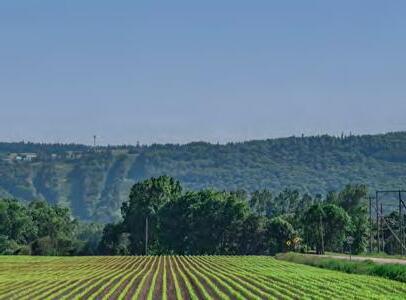

✓ A long-term plan that will help bring together action on priority environment and climate issues in the agriculture sector.
✓ Shared direction and vision for collective action to improve environmental performance and enhanced resilience to climate change in the sector.
✓ A key resource for the Canadian agriculture sector to take action on environmental and climate issues while providing the vital role of responding to growing demands for healthy and affordable food and supporting economic growth.
Benefits of a Sustainable Agriculture Strategy
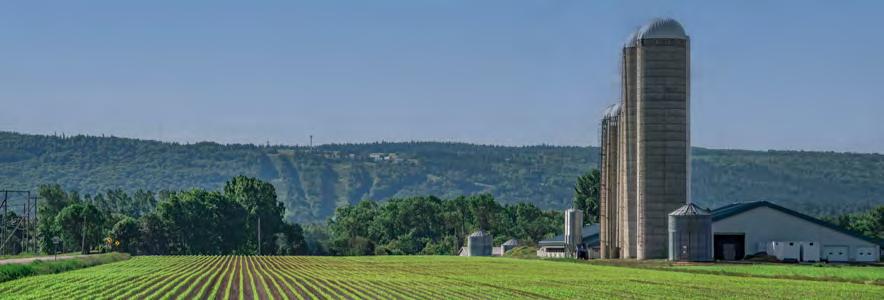
• Strengthen collaboration on environment and climate action in the sector.
• Support the long-term business vitality of the sector.
• Proactively manage climate change impacts.
• Leverage economic opportunities.
• Support Canada’s position as a trusted and sustainable global food provider.
• Contribute to Canada’s 2030 and 2050 climate targets and international commitments.
• Help identify research priorities and innovations to support agri-environmental outcomes.
With a Sustainable Agriculture Strategy, Canada will be well positioned to be a world leader in sustainable agriculture while maintaining its role as a trusted global food provider
Focus Areas for the Strategy
✓ Soil Health
✓ Adaptation & Resilience
✓ Water
Sustainable Agriculture StrategyVision:
✓ Climate Change Mitigation
✓ Biodiversity
Canada is recognized as a world leader in sustainable agriculture and agri-food production and drives forward from a solid foundation of regional strengths and diversity in order to rise to the climate change challenge, to expand new markets and trade while meeting the expectations of consumers, and to feed Canadians and a growing global population.
soil health biodiversity climate change mitigation water adaptation and resilience
Applications open for federal programs under Sustainable Canadian Agricultural Partnership
(March 6, 2023 Agriculture and Agri-Food Canada News Release) The Minister of Agriculture and Agri-Food, the Honourable Marie-Claude Bibeau, announced that applications are now being accepted for federal programs under the Sustainable Canadian Agricultural Partnership (Sustainable CAP) that will go into effect on April 1, 2023. Federal, provincial and territorial governments are investing a record $3.5 billion in the new 5-year agreement to position the sector for continued success as a global leader in agriculture that is environmentally, economically, and socially sustainable. The federal programs, which include AgriAssurance, AgriCompetitiveness, AgriDiversity, AgriInnovate, AgriMarketing and AgriScience, are currently delivered through the Canadian Agricultural Partnership and are being renewed for 5 years to support key priority areas, including:
• strengthening the sector’s ability to grow by focusing on technological advances, attracting a new generation of farmers and creating a more diverse and inclusive workforce
• accelerating the development and adoption of research and innovation in both primary agriculture and valueadded processing
• advancing measurable action on climate change and the environment, including a reduction of 3-5 megatonnes in greenhouse gas emissions
• expanding markets for Canadian exports through global business development and trade promotion, supported by a stronger and more resilient supply chain, with a goal of increasing exports to $95 billion and
overall industry sales to $250 billion by 2028
• establishing even greater trust in the sector by developing and enhancing quality and safety assurance systems. The six federal programs are part of a $1 billion investment that also includes support for trade policy and market access, market development, market information and regulations, sector engagement tables, and foundational science led by Agriculture and Agri-Food Canada.
In addition to these programs, the Sustainable CAP includes $2.5 billion in cost-shared programming that will be delivered by provincial and territorial governments. Bilateral agreements between the Government of Canada and the provincial and territorial governments are in the process of being finalized.
The Sustainable CAP will enable agriculture to be an innovative, productive and internationally competitive sector that can continue to feed Canada and a growing global population at a time when rising costs and global food security are significant concerns.
Quotes
"The Sustainable Canadian Agricultural Partnership includes a suite of programs that will allow our producers and processors to remain competitive and profitable while reducing greenhouse gas emissions from the sector. By opening applications for federal programs today, we are ensuring that there will be no interruption in funding between the old and the new partnership.”
- The Honourable Marie-Claude Bibeau, Minister of Agriculture and Agri-Food
Applications open for federal programs under Sustainable Canadian Agricultural Partnership
Quick facts
• The Sustainable CAP was developed in consultation with a broad group of stakeholders from across Canada.

• Cost-shared funding for programs delivered by provinces and territories has been increased by $500 million to $2.5 billion, up 25% from the current Canadian Agricultural Partnership.
• Details and applications for federal programs are now available online for AgriAssurance, AgriCompetitiveness, AgriDiversity, AgriInnovate, AgriMarketing and AgriScience at agriculture.canada.ca/sustainable-cap.
• The agriculture and agri-food value chain continues to be an economic engine driving Canada’s economy, contributing nearly $135 billion of national GDP. in Canada.
• Exports of agriculture, agri-food, fish and seafood products grew to $92.6 billion in 2022, compared to $82.4 billion in 2021.
Details and applications for federal programs are now available online at agriculture.canada.ca/sustainable-cap.
Sustainable CAP builds off the success of the Canadian Agricultural Partnership, which ends on March 31, 2023. The Sustainable CAP runs from April 1, 2023 to March 31, 2028.
Related products
• Federal programs under the Sustainable Canadian Agricultural Partnership
Associated links
• Sustainable Canadian Agricultural Partnership
Major Jay Fox Memorial Scholarship
The Major Jay Fox Memorial scholarship has been developed by the Manitoba Outstanding Young Farmers To honour Jay and the contribution that he made to agriculture in Canada. An annual scholarship will be presented to recognize a student continuing in the field of agriculture that has made a significant difference in their communities. One bursary will be awarded annually in the amount of $1000.00.
The following criteria have been developed and applications must be received no later than May 31st All applications can be sent electronically to “Manitoba Outstanding Young Farmers”, c/o Anita Penner to anita.penny50@gmail.com
Eligibility:
Applicants must be at least 17 years of age as of January 1st
It is a requirement that this bursary is to be used within the two years.
Must submit a 250 word (maximum) typed essay; stating their future goals in agriculture and “In your opinion, what could be done to retain a larger number of young people in agriculture in Manitoba (Canada)”.
Applicant is required to submit proof of enrolment in a recognized institution (e.g. transcript)
Applicant is required to submit a list of community involvement (e.g. 4-H, community clubs, volunteer work, etc.)
Post-secondary program or trades training no less than minimum of 6 months in duration is required to apply. Please provide two letters of reference from persons outside of your family that indicate your work experience, community involvement, etc.
All written material submitted by the applicant although voiding personal contact information will become the property of Manitoba’s Outstanding Young Farmers and as such will be published at the discretion of the association with proper credit to the author
Preference will be given to those students pursuing a field of study related to agriculture or to those acquiring a skilled trade that would be beneficial to the rural economy.
Completed applications must be submitted by 4:00 p.m. on May 31.
Applications should be sent electronically to Anita Penner c/o MBOYF anita.penny50@gmail.com Winners will be notified and the scholarship will be presented at the following years Manitoba’s Outstanding Young Farmers Regional Event.
Reminder: Beef Producers Invited to Participate in a Survey re: Swath Grazing
Manitoba producers are reminded that there is still time to participate in an online research survey related to swath grazing.
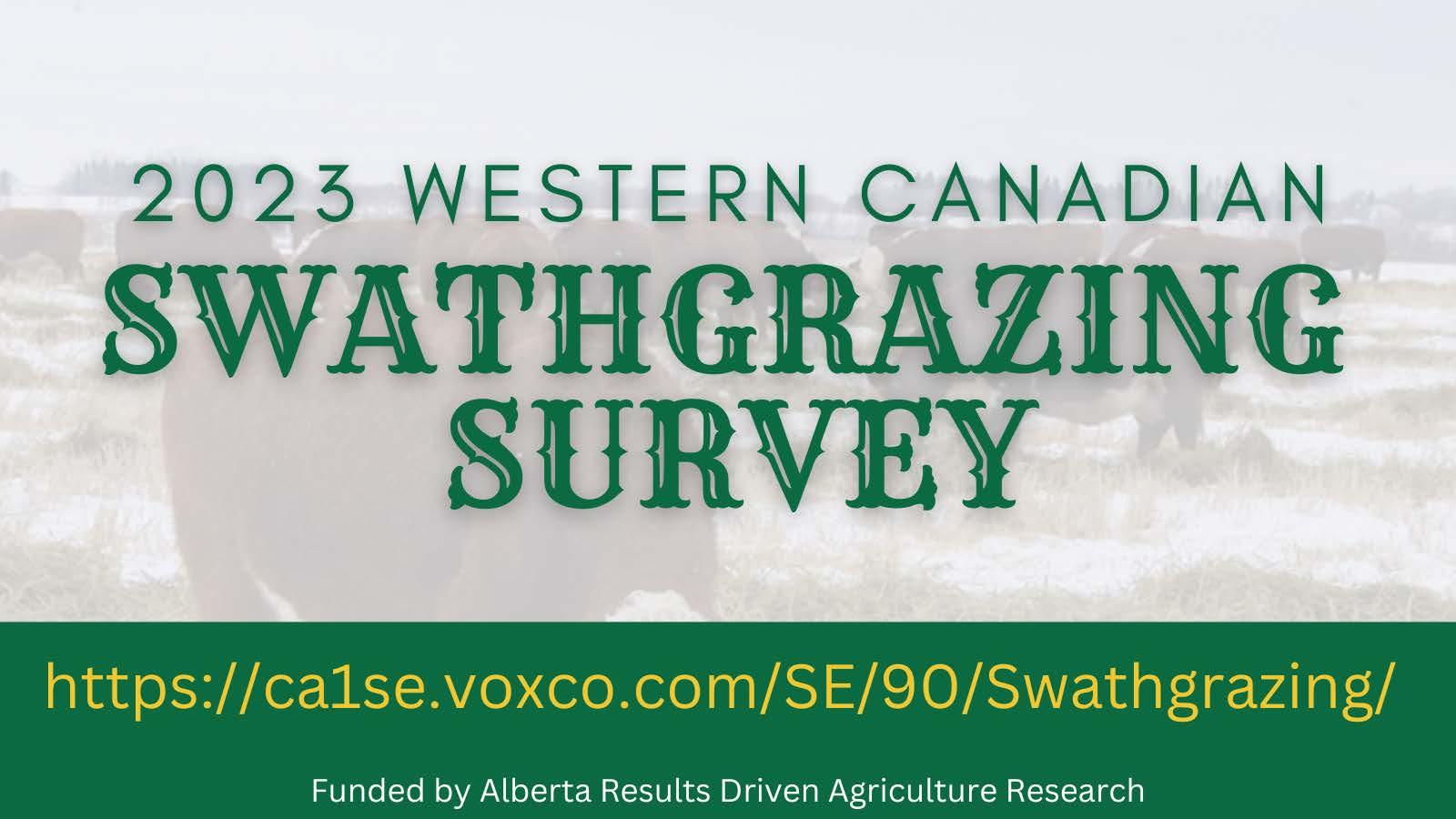
The purpose of the swath grazing research is to understand the use of swath grazing and spring residue cleanup by western Canadian cow-calf operations. Producer responses will help promote strategies that will advance the Canadian beef industry. This study is for research purposes only.
Respondents can be both adopters, non-adopters and dis-adopters of swath grazing as they wish to hear how adopters swath graze, why non-adopters choose not to swath graze and why dis-adopters stopped swath grazing. The survey will close when 600 respondents are reached (likely March 31, 2023).
The swath grazing survey research is funded by Alberta’s Results Driven Agriculture Research and is being conducted by researchers at the University of Saskatchewan (Kathy Larson) and Lakeland College (Dr. Obi Durunna). Dr. Durunna is a Livestock Research Scientist at Lakeland College and an Adjunct Professor at the University of Saskatchewan and Larson is a Professional Research Associate at the University of Saskatchewan’s College of Agriculture and Bioresources, Department of Agricultural and Resource Economics.
The survey link is: https://ca1se.voxco.com/SE/90/Swathgrazing/
Anyone with questions about the 2023 survey can contact Larson at kathy.larson@usask.ca or at (306) 966-4025.

















